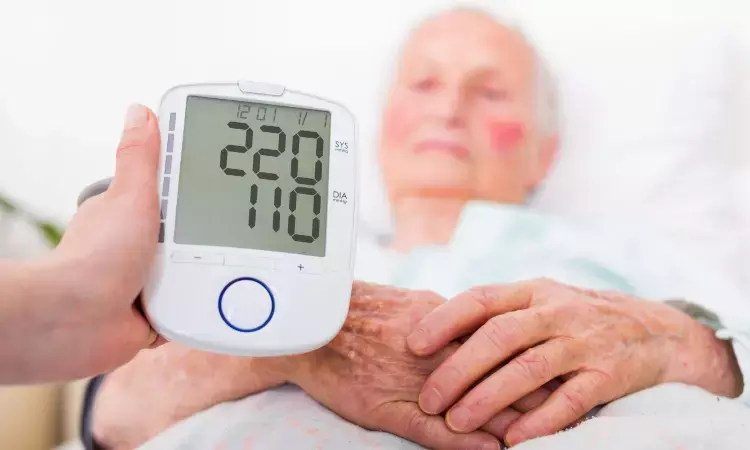- Home
- Medical news & Guidelines
- Anesthesiology
- Cardiology and CTVS
- Critical Care
- Dentistry
- Dermatology
- Diabetes and Endocrinology
- ENT
- Gastroenterology
- Medicine
- Nephrology
- Neurology
- Obstretics-Gynaecology
- Oncology
- Ophthalmology
- Orthopaedics
- Pediatrics-Neonatology
- Psychiatry
- Pulmonology
- Radiology
- Surgery
- Urology
- Laboratory Medicine
- Diet
- Nursing
- Paramedical
- Physiotherapy
- Health news
- Fact Check
- Bone Health Fact Check
- Brain Health Fact Check
- Cancer Related Fact Check
- Child Care Fact Check
- Dental and oral health fact check
- Diabetes and metabolic health fact check
- Diet and Nutrition Fact Check
- Eye and ENT Care Fact Check
- Fitness fact check
- Gut health fact check
- Heart health fact check
- Kidney health fact check
- Medical education fact check
- Men's health fact check
- Respiratory fact check
- Skin and hair care fact check
- Vaccine and Immunization fact check
- Women's health fact check
- AYUSH
- State News
- Andaman and Nicobar Islands
- Andhra Pradesh
- Arunachal Pradesh
- Assam
- Bihar
- Chandigarh
- Chattisgarh
- Dadra and Nagar Haveli
- Daman and Diu
- Delhi
- Goa
- Gujarat
- Haryana
- Himachal Pradesh
- Jammu & Kashmir
- Jharkhand
- Karnataka
- Kerala
- Ladakh
- Lakshadweep
- Madhya Pradesh
- Maharashtra
- Manipur
- Meghalaya
- Mizoram
- Nagaland
- Odisha
- Puducherry
- Punjab
- Rajasthan
- Sikkim
- Tamil Nadu
- Telangana
- Tripura
- Uttar Pradesh
- Uttrakhand
- West Bengal
- Medical Education
- Industry
Night-time ambulatory blood pressure more predictive of death risk

Spain: A recent observational cohort study published in The Lancet has found that ambulatory blood pressure measurements, particularly those taken at night, are more strongly associated with the risk of all-cause and cardiovascular mortality than clinic blood pressure measurements.
The study sought to investigate the relationships between clinic and 24-hour ambulatory blood pressure and all-cause and cardiovascular death in a large cohort of primary care patients referred for hypertension evaluation.
The study, which included data from the Spanish Ambulatory Blood Pressure Registry, analyzed clinic and ambulatory blood pressure data from over 59,124 primary care patients referred for assessment of hypertension.
Cox models were used to estimate associations between blood pressure and mortality, and participants were followed up until death or the end of 2019. Confounders and alternative measures of blood pressure were adjusted for, and five groups were created for each measure of blood pressure based on quintiles among those who subsequently died.
The study revealed the following clinical findings:
1. 59,124 patients were followed up for 9.7 years, during which 12.1% (7,174) died, including 4.0% (2,361) from cardiovascular causes.
2. 24-hour systolic blood pressure was strongly associated with all-cause death (HR 1.41) compared to clinic systolic blood pressure (HR 1.18).
3. Night-time systolic blood pressure was most informative about the risk of all-cause death (591%) and cardiovascular death (604%) compared to clinic blood pressure.
4. Elevated all-cause mortality risks were observed for masked hypertension and sustained hypertension, but not white-coat hypertension.
“The findings suggest that ambulatory blood pressure measurements, particularly those taken at night provide a more comprehensive assessment of blood pressure and are better predictors of health outcomes than clinic or home pressure measurements.” added the researchers of the study.
The study highlights the importance of considering ambulatory blood pressure measurements, particularly those taken at night, in the assessment of hypertension and in predicting the risk of all-cause and cardiovascular mortality. Further research is needed to determine the optimal use of ambulatory blood pressure measurements in clinical practice.
Reference:
Staplin N., de la Sierra A., Ruilope L., Emberson J., Vinyoles E., et al.; Relationship between clinic and ambulatory blood pressure and mortality: an observational cohort study in 59 124 patients; The Lancet Open Access, 2023; doi: https://doi.org/10.1016/S0140-6736(23)00733-X
Dr. Mahalakshmi Sivashankaran joined Medical Dialogues as an Intern in 2023. She is a BDS graduate from Manipal College of Dental Sciences, Mangalore Batch 2022, and worked as a Junior Resident at VMMC & Safdarjung Hospital at the Department of Dental Surgery till January 2023. She has completed a Diploma in Executive Healthcare management from the Loyola Institute of Business Administration, developing skills in Healthcare Management and Administration. She covers several medical specialties including Dental, ENT, Diagnostics, Pharmacology, Neurology, and Cardiology.
Dr Kamal Kant Kohli-MBBS, DTCD- a chest specialist with more than 30 years of practice and a flair for writing clinical articles, Dr Kamal Kant Kohli joined Medical Dialogues as a Chief Editor of Medical News. Besides writing articles, as an editor, he proofreads and verifies all the medical content published on Medical Dialogues including those coming from journals, studies,medical conferences,guidelines etc. Email: drkohli@medicaldialogues.in. Contact no. 011-43720751


